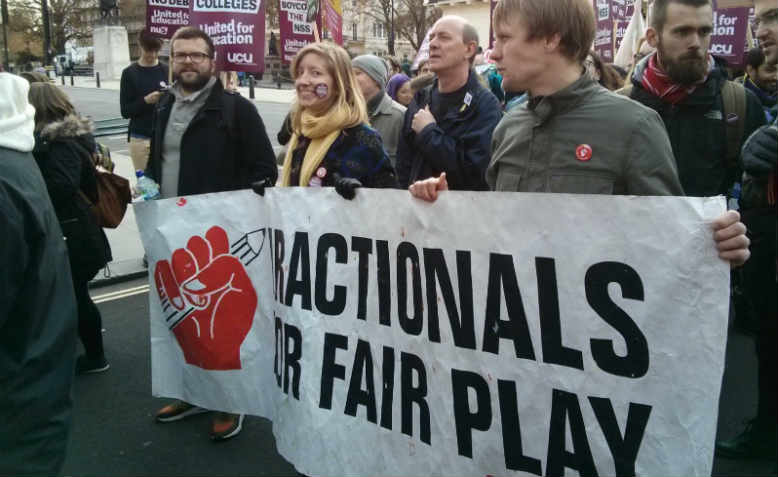 United for Education demonstration, 19 November 2016, London. Photo: FFFP
United for Education demonstration, 19 November 2016, London. Photo: FFFP
Reporting the extent of precarity across the university sector in Britain is welcome but precarious work needs to end now, argues Carrie Benjamin
Last week The Guardian ran a series of articles on the proliferation of casual contracts and the exploitation of teaching staff in universities around the UK. The reports, compiled and analysed with the help of the University and College Union (UCU), revealed that 53% of academic staff working at universities across Britain are employed on insecure, fixed-term or zero hours contracts. While these accounts are important for shedding light on the increasing precarity of academic staff in institutions where tuition fees are set to increase every year for the foreseeable future, it is hardly ‘news’ to many of us employed in the sector.
At SOAS, University of London, hundreds of ‘fractional’ staff—those employed on permanent or fixed-term contracts whose part-time salaries are calculated as a ‘fraction’ of a full-time salary—have been living this reality for years. This year, dozens of fractional staff at SOAS have been issued with incorrect payments, placed on the wrong tax codes, or have not been paid at all after seven weeks of teaching. Late and incorrect contracts have become so normalised within the institution over the years that one respondent to a workload survey conducted by the Fractionals for Fair Play (FFFP) campaign earlier this year stated, ‘when I am paid [in] a timely fashion I feel [that] something is wrong’. The situation at SOAS is such that some of the lowest-paid workers, many of whom do not earn the London Living Wage when the actual number of hours worked are taken into account, are not being paid at all.
In 2014, SOAS fractional staff won minor contract improvements and increased pay following unauthorised industrial action organised by FFFP. For six weeks, fractionals refused to mark essays until they were granted a negotiation meeting with management. In the end, no agreement was reached between SOAS and UCU, so the university imposed the moderately improved contracts on fractional staff, which included compensation for training and office hours. Despite these improvements, the majority of work conducted by fractional staff at SOAS remains unremunerated.
UCU is currently in negotiation with management for improved conditions, including additional compensation for marking, but if no agreement can be reached fractionals may hold a ballot for strike action. SOAS, like most UK universities, increasingly depends on the labour of casual staff for the school to run efficiently. And, like most other universities, it refuses to acknowledge this through improved contract conditions and pay.
The situation is particularly acute this year, however. Following the recent restructuring of HR, SOAS neglected to hold induction sessions for nearly 400 new and returning fractional staff in September. This meant that new staff were not asked to submit their bank account details for payment, and returning staff were placed on emergency tax codes even though many do not earn enough to surpass the tax-free allowance. Fractionals with annual incomes of £3,000 (yes, you read that correctly) are having taxes deducted from their monthly wages based on full-time salaries.
Horrific reports have also been brought to the attention of SOAS UCU about fractional staff members who were unable to pay their rent in November because the university had yet to issue them with a contract and payment. When these cases have been raised with management within the university, however, they are treated as isolated incidents rather than widespread evidence of underpayment. Fractional staff increasingly feel as though they are an afterthought in an institution where they do the bulk of undergraduate teaching.
Although fractional staff have become accustomed to annual contract irregularities at SOAS, this year’s errors highlight deeper issues within the institution and the higher education sector as a whole. SOAS, like other universities, is suffering at the hands of Conservative government cuts aimed at privatising and commodifying higher education. While the British Government can afford to refurbish Buckingham Palace and drop bombs on civilians in Syria, it enforces austerity elsewhere and asks students to borrow from their futures to purchase an education.
As this idea of the ‘consumer student’ takes hold, universities are fighting to recruit larger numbers in an increasingly competitive environment. They purchase and build new facilities, increase advertising (SOAS currently pays The Guardian to write advertising content for them), and seek to save money on staff expenditures. For instance, hiring additional HR staff could solve the annual problem of late and missing contracts at SOAS, but that would require money the school cannot or will not spend.
However, universities are not blameless in this scenario; university bosses have seen an increase in pay of 14% over the last five years. Meanwhile, permanent academic positions are disappearing in UK universities, and they are being replaced by precarious, low-paid staff who are expected to deliver ‘high-quality teaching’ to students paying £9,000 per year. The treatment of fractional staff is indicative of the state of higher education in the UK.

